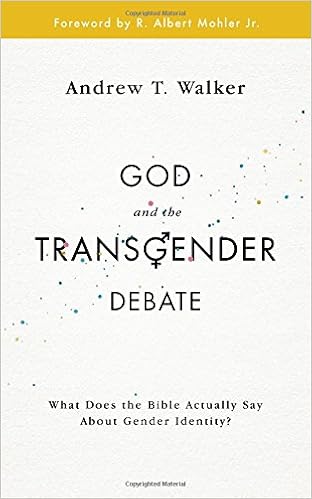Review of "God and the Transgender Debate"
God and the Transgender Debate, written by Andrew T. Walker, is an attempt to present the biblical teaching on gender identity and to explore its implications for trans persons, for their friends and family, and for the church.
God and the Transgender Debate is split up into three parts, composed of thirteen short chapters. In Part I Walker gives a brief history of how he believes we have come to the current cultural moment with regard to trans issues. In Part II Walker presents his argument from Scripture that sex and gender are coextensive and that the transgender experience must ultimately be judged as illusory and that transitioning or trans-affirming conduct must be judged as sinful. In Part III Walker tackles difficult topics regarding how Christians should deal with trans issues in the church, the home, school, and in public policy.
Walker does a number of important things well in this short book. He helps to advance the conversation by arguing that gender dysphoria is not chosen and is not in itself sinful (though it is a disordered condition and a symptom of a fallen world). He suggests that the experience of gender dysphoria might very well remain a lifelong thorn in the flesh for those who suffer from it. I appreciate Walker’s willingness to state difficult truths when necessary rather than offer the false hope that conversion therapy advocates have tried to peddle to us LGB Christians. Walker rebukes parents who have kicked their trans kids out of their homes, and he also rebukes Christians who have contributed to making the church a place of danger for trans persons, when it should be a place of love, truth, and safety.
Walker can’t seem to decide whether he wants this book to help trans persons and those who love them or to launch another salvo in the culture wars. From the foreword, written by Al Mohler, which begins, “The Christian church in the West now faces a set of challenges that exceeds anything it has experienced in the past.” (Paging Perpetua and Felicitas: Perpetua and Felicitas to the white courtesy phone, please.) In his penultimate chapter, a FAQ chapter, Walker addresses the question of intersex persons…except that he doesn’t. Rather, he addresses LGBT+ activists’ strategic use of intersex persons to gain cultural acceptance of [other] trans persons. This tension between treating trans persons as objects of Christ’s love and treating them as sometimes unwitting, sometimes complicit political pawns manifests itself throughout the volume.
Gentle reader, if you purchased this book hoping for some incisive commentary on gender theory and queer theory, you are in for a disappointment. (Although, it is 2017, so you should be used to experiencing disappointments.) The specters of Simone de Beauvoir and Judith Butler do not trouble these Louisvillian skies. Rather, Walker’s research base on trans issues seems to have been limited to Mark Yarhouse’s Understanding Gender Dysphoria, a few articles and blog posts, and a YouTube clip. A person of average reading speed could cover all this material in an eight-hour work day. God and the Transgender Debate is not the product of sustained reading of and reflection on trans persons, their experiences, and the related issues.
This lack of due diligence shows itself rather starkly in the abbreviated trans history portrayed in God and the Transgender Debate, a history which for Walker seems to have begun in 2015 with Caitlyn Jenner’s coming out as trans. He begins and ends his book with Jenner, taking her as a sort of de facto leader of the trans community, which further illustrates the lack of involvement with the trans community; Jenner is persona non grata in the trans community.
Amazon’s Transparent with Jeffrey Tambor debuted in 2014. Orange Is the New Black debuted on Netflix in 2013. RuPaul’s Drag Race started in 2009. Episodes of Star Trek: The Next Generation, Star Trek: Deep Space Nine, and Twin Peaks featured trans persons and issues throughout the 1990’s. We had Paris Is Burning in 1990. Rocky Horror Picture Show in 1975. Trans persons were instrumental to the Stonewall Riots in 1969. For that matter, half of Shakespeare’s comedies seem to involve men dressing and acting as women and vice versa. That Walker can say, in 2017, that he hopes his book will help the church to get out ahead of the trans conversation is mind-boggling. We are already at least half a century behind!
Walker stresses the importance of loving trans persons face-to-face, but God and the Transgender Debate is not a book that was born out of such loving engagement. There is no sustained engagement with trans persons’ accounts of their own experiences. A book that claims to be born from a pastoral concern for trans persons might be expected to give some evidence that actual trans persons have been on the receiving end of this pastoral concern. However, it is not even clear whether Walker has ever spoken with a trans person. The closest he seems to come is being involved in a kind of colloquium along with a trans woman and consulting Melinda Selmys, a Spiritual Friendship contributor who experiences gender dysphoria.
Don’t get me wrong; I’m glad that books like this are being written. I’m just not glad that books are being written like this. We need a well-researched volume on trans issues by a sympathetic, theologically-informed Christian who is active in her or his local LGBT community. Better still would be a volume that contributes to a “Side B” approach to gender dysphoria which would explore redemptive aspects to the experience of gender dysphoria.
But perhaps I shouldn’t be so picky. It is 2017, after all.



Comments
Post a Comment